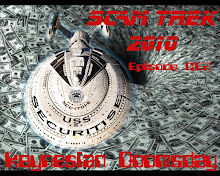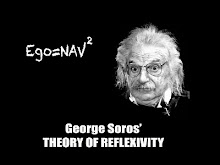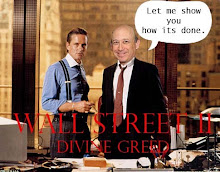THE BAD NEWS:
The Federal Reserve announced Tuesday that it had named Patrick M. Parkinson, an expert on financial markets, to be the director of its division of banking supervision and regulation.
Mr. Parkinson, is an economist who has been with the Fed since 1980.
“As an economist with deep expertise in financial markets, Pat Parkinson will be an important asset at a time when we are focusing on a multidisciplinary approach to banking supervision and regulation,” the Fed’s chairman, Ben S. Bernanke, said in a statement.
Zero Hedge Blog reports this example of Mr. Parkinson's astute economic "sight of the board."
Testimony of Patrick Parkinson
Deputy Director, Division of Research and Statistics
Commodity Futures Modernization Act of 2000
Before the Committee on Banking, Housing, and Urban Affairs, U.S. Senate
September 8, 2005
The Federal Reserve Board believes that the CFMA has unquestionably been a successful piece of legislation. Most important, as recommended by the President’s Working Group on Financial Markets in its 1999 report, it excluded transactions between institutions and other eligible counterparties in over-the-counter financial derivatives and foreign currency from regulation under the Commodity Exchange Act (CEA).
As the Working Group argued, regulation of such transactions under the CEA was unnecessary to achieve the act’s principal objectives of deterring market manipulation and protecting investors.
Such transactions are not readily susceptible to manipulation and eligible counterparties can and should be expected to protect themselves against fraud and counterparty credit losses.
Exclusion of these transactions resolved long-standing concerns that a court might find that the CEA applied to these transactions, thereby making them legally unenforceable. At the same time, the CFMA modernized the regulation of U.S. futures exchanges, replacing a one-size-fits-all approach to regulation with an approach that recognizes that the regulatory regime necessary and appropriate to achieve the objectives of the CEA depends on the nature of the underlying assets traded and the capabilities of market participants. Together, these provisions of the CFMA have made our financial system and our economy more flexible and resilient by facilitating the transfer and dispersion of risk. Consequently, the Board believes that major amendments to the regulatory framework established by the CFMA are unnecessary and unwise.
http://www.zerohedge.com/article/patrick-parkinson-case-study-how-get-promoted-fed#comment-105155
THE GOOD:
At least Mr. Parkinson is not a former employee of Goldman Sachs.
THE UGLY:
Adam "Agarn" Storch, the 29 year old former Goldman Sachs Vice President who will be the role of the SEC's new COO of Enforcement, was chief derivative signature fraud verifier at Goldman Sachs.
He certainly did a good job verifying AIG's signatures.
Subscribe to:
Post Comments (Atom)




































.jpg)












No comments:
Post a Comment